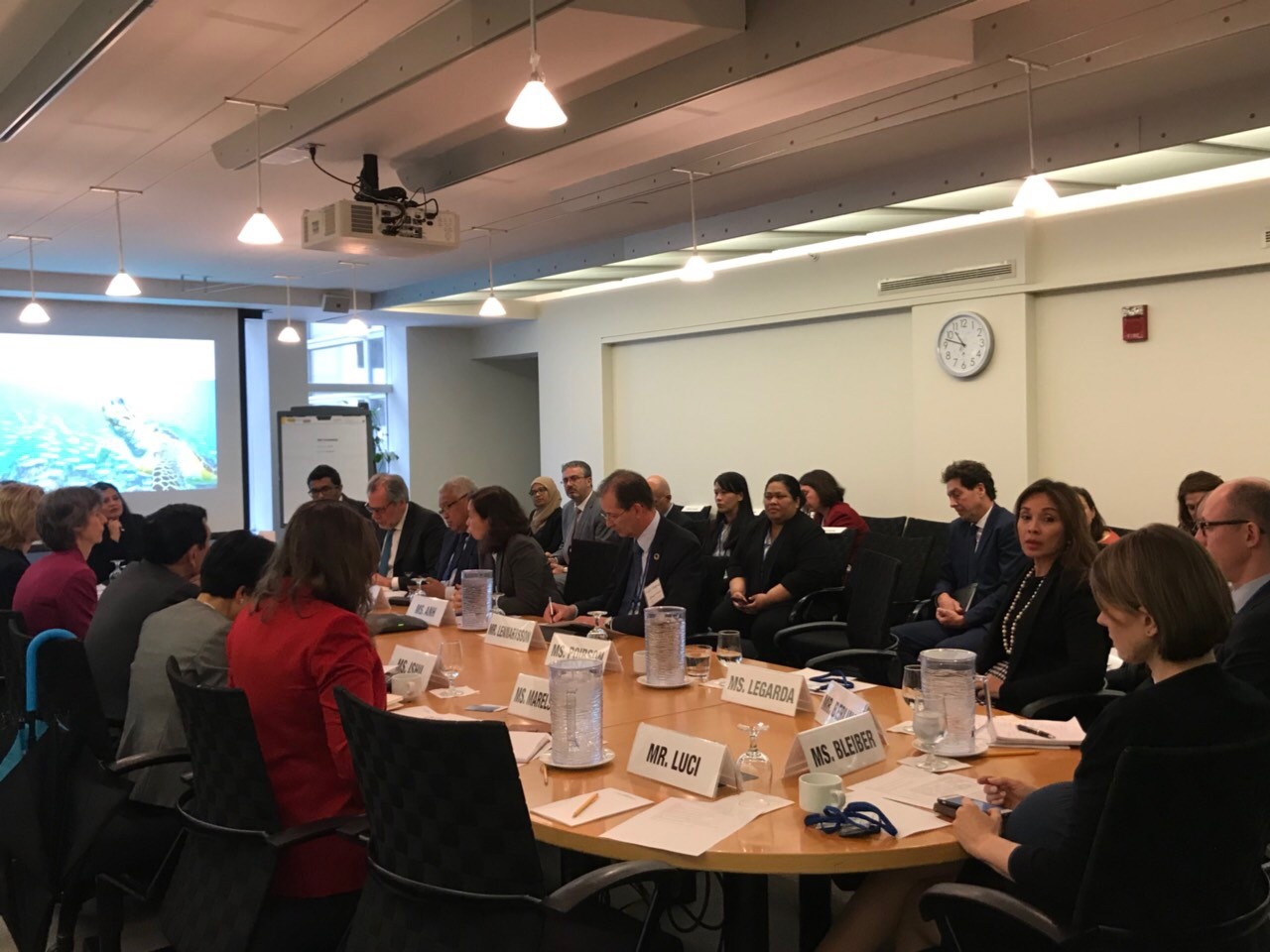
April 01, 2018 Sunday

Senator Loren Legarda at the High-Level event, “Towards a Blue Economy: Concrete Actions for Addressing the Ocean Health,” where she shared that despite the challenges of being a developing archipelagic country with a hundred million population, the Philippines is carrying out efforts to move towards a blue economy. The event is part of the 2018 Spring Meetings of the International Monetary Fund (IMF) and the World Bank Group.
Senator Loren Legarda today said that despite the challenges of being a developing archipelagic country with a hundred million population, the Philippines is carrying out efforts to move towards a blue economy.
At the High-Level event, “Towards a Blue Economy: Concrete Actions for Addressing the Ocean Health,” which is part of the 2018 Spring Meetings of the International Monetary Fund (IMF) and the World Bank Group, Legarda shared the challenges and actions being done by the Philippine government to protect and rehabilitate the country’s marine ecosystems.
“The Philippines has one of the world’s richest marine ecosystems. It is located within the Coral Triangle and houses what is considered the world’s center of the center of marine biodiversity, the Verde Island Passage. Unfortunately, only one percent of coral reefs in our country remains in excellent condition; coastal cities and municipalities are threatened by creeping sea level rise; and we are one of the top sources of plastic trash dumped into the sea,” said Legarda.

The Senator said that what happened in Boracay island, considered as among the best beaches in the world, is an example of wanton disregard for our marine ecosystems.
She noted that around 17.5 million liters of wastewater is generated in Boracay island every day and only about half of which is treated properly, while the other half is discharged untreated. Moreover, 5 of the 9 wetland areas in the island have been encroached upon by various structures or establishments.
“The Philippine government has ordered the temporary closure of Boracay to be able to fully rehabilitate the island and hopefully bring it back to its pristine state, if this is at all possible,” said Legarda.
Laura Tuck, World Bank’s Vice President for Sustainable Development, lauded the bold move of the Philippines to close an entire island for the protection and rehabilitation of its marine ecosystem.
Moreover, Legarda shared that as part of its commitment with the international community to protect marine ecosystems, the Philippines recently acceded to several treaties, such as the Agreement to Promote Compliance with International Conservation and Management Measures by Fishing Vessels on the High Seas; the Port State Measures Agreement, which is the first binding international agreement to specifically target illegal, unreported and unregulated (IUU) fishing; the International Convention on the Control of Harmful Anti-Fouling Systems on Ships; and the MARPOL Protocol, which prevents and minimizes pollution from ships by setting limits on sulphur oxide and nitrogen oxide emissions from ship exhausts, which are harmful to human health, and prohibits deliberate emissions of ozone depleting substances.
On the country level, Legarda said that the Philippine government implements the Sustainable Coral Reef Ecosystem Management Program (SCREMP), a national program on the protection and rehabilitation of coral reef ecosystems through a strategic, sustainable and ecosystem-based approach.
The Philippines also has the Ecological Solid Waste Management Law, authored by Legarda, which promotes a clean and healthy environment through segregation of waste at source, recycling and composting.
Legarda also said that she will file measures to promote a circular economy, in which resources are used for as long as possible and the use of non-renewable resources is minimized, and to ban the use of microplastics.
According to the National Oceanic and Atmospheric Administration (NOAA), microplastics are small plastic pieces that can easily pass through water filtration systems and end up in the ocean, posing threat to the aquatic life and human health. Microbeads is a type of microplastic that is added as exfoliants to cleansers, toothpaste, beauty products, and shampoo.
USA already has a Microbead-Free Waters Act, Canada has banned products with plastic microbeads, and the United Kingdom has officially banned the use of plastic microbeads in cosmetics and personal care products.
“A ban on microplastics and single-use plastics is a measure that I wish to propose in the Philippine Senate. We need to reduce wastage and veer away from a throwaway culture, because the waste that we produce, unless minimized and managed properly, will find its way into our oceans and will affect both marine and human life,” Legarda concluded.
Senator Loren Legarda, Chair of the Senate Committees on Foreign Relations, Finance and Climate Change, is the Alternate Head of the Philippine Delegation to the 2018 Spring Meetings of the IMF and the World Bank Group in Washington, D.C., USA.